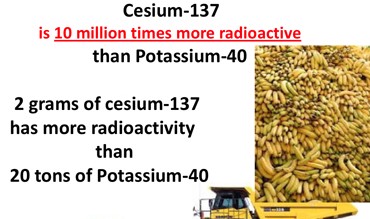– L.A. News Outlet: Fukushima plume worries to sink fishing industry? Area newspapers “warning readers to avoid eating locally-caught fish” — Homeland Security Center director: Banana has 100 times more radiation (VIDEO) (ENENews, April 17, 2014):
Neon Tommy (L.A.-based news source, USC’s Annenberg School for Communication and Journalism), Apr. 16, 2014: Could Radiation Fear Sink The Fishing Industry? — Fisherman Mike McCorkle has been fishing for 60 years and contends that he may be facing his biggest challenge yet. In the past few months he says that Korean newspapers in the L.A area have been warning their readers to avoid eating locally-caught fish. The Korean press claims that locally-caught fish contain radiation. […] Woods Hole Institute of Oceanography [sic] […] confirmed that a plume of radiation from Fukushima will arrive on the American West coast in April […] Although the science refutes any danger from consumption of Pacific fish [See: Expert: Cancer increase for West Coast from Fukushima exposures; No safe dose of radiation] some still retain a fear of radiation. Santa Barbara’s Seagrass Restaurant no longer serves Pacific fish. […] One source of [the head chef’s] fear is because he subscribes to the independent news site ENE News, which compiles negative news on Fukushima and its effects on seafood. […]
Robert Perez, Seagrass Restaurant’s head chef: I have heard too many stories of starfish melting and the collapse of the sardine, salmon, anchovy, squid and oyster industries in the Pacific to be comfortable preparing them.
Isaac Maya, Director of Research at USC’s Homeland Security Center: One ten ounce serving of Blue fin Tuna that swum from Japan to the United States contain one nanosievert of radiation. By comparison one banana contains 100 nanosieverts. [See: Expert: Cesium-137 found in tuna emits 10,000,000 times more radiation per unit volume than banana’s potassium-40]
Transcript Excerpts
- 0:30 in — Perez: I feel that there is a good possibility that the seafood is contaminated. I just don’t want that on my conscience that I have been feeding people contaminated fish.
- 1:00 in — Byron Tseng, reporter: Although radiation originating from Fukushima has been detected in locally caught tuna, experts say there is nothing to worry about.
- 1:15 in — Maya: It is unlikely that any fish that swims in the diluted water will absorb enough radiation to cause a problem.
- 1:30 in — Rex Ito, tuna importer: It is not a health issue at all.
- 1:45 in — Tseng: Experts predict the plume of radiation from Fukushima will arrive this month, but people in the fishing industry assure us that seafood with a side of radiation will not be on the menu.
